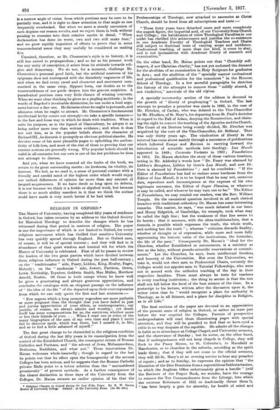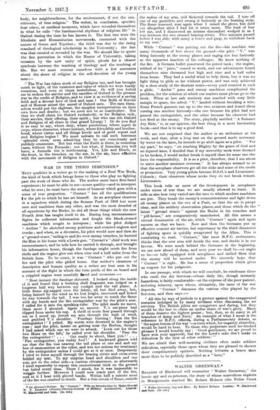RELIGION IN OXFORD.• Tuz Master of University, having completed fifty
years of residence in Oxford, has taken occasion by an address to the Oxford Society for Historical Theology to describe the changes which he Ices witnessed during that period in matters of religion. The paper is one the importance of which is not limited to Oxford, for every religious movement which has thrilled that sensitive University has very quickly spread through England. But to Oxford men, of course, it will be of special interest ; and they will find in it abundance of that quiet wisdom and ironical wit for which the Master of University is celebrated. First of all he passes in review the leaders of the two great parties which have divided between them religious influence in Oxford during the past half -century ; on the " traditionalist " aide, Pusey, Liddon, King, Morley, Paget, Moberly ; on the " modernist " side, Jewett, Pattison, Green, Lewis Nottleship, Toynbee, Goldwin Smith, Max Muller, Matthew Arnold, Ruskin. Of those in both oampe whom he knew well he gives a penetrating and always generous appreciation, and concludes the catalogue with an eloquent passage on the influence of " the idea of the life " of the departed upon their contemporaries from which we can only quote the first and let sentences:—
" Few regrets which a long memory engenders are more pathetic or more poignant than the thought that you have failed in just and joyous appreciation of your elders, or contemporaries ; our juniors, of course, we always admire and worship ; yet death itself has some compensations for us, the survivors, whether more or lees their friends of yore. . . . When I read one or other of the many biographies of the men of my own time and place I never fail to discover merit, which was there, but I missed it, in life; and so to feel a little ashamed of myself:.
The first great change to be chronicled in the religious condition of Oxford during the last fifty years ie its emancipation from the control of the Established Church, the consequent return of Roman Catholics and Puritans, and " the advent of Jews, Mohammedans, Brahmins, Buddhists, and what not." These innovations Dr. Ilman welcomes whole-heartedly ; though in regard to the last lie points out that its effect upon the homogeneity of the several Colleges has been serious, and he suggests that the Roman Catholic private Halls point to a better solution than the "unconsidered promiscuity" of present methods. As a further consequence of the clearer distinction in these days of the University from the Colleges, Dr. Madan recants an earlier opinion of his that the • Maisie. Mown is aslant durim an Lose Pills Yam. B)• R. W. Banc, Muter at UnirentitY Cotes. exteel: at the uafvenity eras. It,, 8d. aeti
Professorshipa of Theology, now attached to canaries at Christ Church, should be freed from all subscriptions and teats .— " These forty years have detached more and more completely the august figure, the impartial soul, of our University from Church and College ; the habilitation of other Theological Faculties in our midst hoe clarified this achievement and justifies the oo-exietence hi one Academie Faculty of Theological Teacher. and Chairs still subject to doctrinal tests of varying scope and incidence. Confessional teaching, of more than one kind, is come to stay, and is not inconsistent with Academic liberty of research and examination."
On the other hand, Dr. Mican points out that " Churchly self- respect, if not Christian charity," has not yet endorsed the demand for the abolition of an examination in Holy Scripture for graduates in Arts ; and the abolition of the " specially narrow confessional and professional qualification for the examiners " in the Honour. School of Theology. IS e few scornful paragriphs he sketches the history of the attempts to remove these " mildly absurd, if not vindictive," survivals of the old riaints.
A specially noteworthy section of the address is devoted to the growth of "liberty of prophesying" in Oxford. The last attempt to penalize a preacher was made in 1880, in the case of Mr. Fletcher, of eerier, who was deleted to the Vies-Chancellor by Mr. Ffoulkes, of St. Mary's, for departing from St. Paul's doctrine in regard to the Fall of Adam, denying the Resurrection, and claim- ing the right to correct the teaching of the Apostles and the Church. The Court of six Doctors being evenly divided, Mr. Fletcher was acquitted by the vote of the Vice-Chancellor, Dr. Bellamy. That was only thirty years ago. The vindication of liberty in the interval has come about mainly through a succession of publications which followed Essays and Reviews in carrying forward the introduction of scientific methods into theology. Luz Mundi appeared in 1889 ; Contentio Veritatis in 1902 ; Foundations in 1912. Dr. Macau sketches the story of these various treatises, noting in Mr. Adderley'a words how " Dr. Posey was alarmed by Liddon's Bamplons, Liddon by Gore's Lux Mundi, and now Dr. Gore ie alarmed by Foundations" ; and he concludes " If the Editor of Foundations has had to endure some hardness from the Editor of Lux Munch, it is to be hoped that he may not, accasirate data, reproduce such inconsequence at the expense of his own legitimate successor, the Editor of Super /lumina, or whatever it may be called, and whoever he may turn out to be." The Editor of Foundations, we may remind our readers, was the Rev. William Temple. On the casuistical question involved in all such clerical broaches with traditional orthodoxy Dr. McLean has some interesting remarks. The matter, he says, " was much debated in our time, and Henry Sidgerick, of Cambridge, for example, took what may be called the high line ; but the weakness of that line seems to lie herein : that it assumes, with the ultra-traditionalists, that a formula is possible which expresses the truth, the whole truth. and nothing but the truth " ; whereas " criticism discards finality, whether of thought or of expression, while more and more fully appreciating the historic value of the institutions, the formulas, the life of the past." Consequently Dr. Mamie " ideal for the Churches, whether Established or autonomous, is a ministry as free as the laity, without pseudo-scientific reservations or commit- ments." Let the Churches, he says, learn intellectual freedom and honesty, of the Universities. But even the Universities, we take it, would not elect men to Professorial Chairs, certainly the Colleges would not appoint men to Tutorial Fellowships, who were not in accord with the orthodox teaching of the day in their respective faculties. There must always be tests for teachers in every teaching institution ; the thing to secure is that the test shall not fall below the level of the beet science of the time. In a postscript to his lecture, written after the discussion upon it, the writer owns that he " would recognize a place for authority in Theology, as in all Science, and a place for discipline in Religion, as in all Life."
The final sections of the paper are devoted to an appreciation of the present state of religion in Oxford, or rather its state just before the war emptied the Colleges. Parents of prospective undergraduates will read these illuminating pages with special attention, and they will be gratified to find that so keen-eyed a critic in no way despairs of the republic. He admits all the changes in habit as to attendance at College Chapel, and University sermons, and the observance of Sunday ; but he notes, on the other hand, that if undergraduates will not keep chapels in College, they will flock to the Pusey House, to St. Columba's, to Mansfield or Manchester, or to churches in the suburbs, according as the spirit leads them ; that if they will not come to the official sermons, they will fill St. Mary's at an evening service to hear any preacher of repute ; and as to Sunday, he expresses the opinion that "Elie liberation of the Dies Dominica from a superstitious Sabbatarianism. to which the Anglican Office unfortunately gives a handle " (will the Revisers of the Prayer Book, we wonder, have the courage to remove the Ten Commandments from the Liturgy, into which the extreme Reformers of 1552 so inadvisedly thrust them H. " has been largely a gain for sincerity, for health of mind and
body, for neighbourliness, for the environment, if not the con- stituents, of true religion." The writer, in conclusion, specifies four crises, or cardinal moments, which have revealed themselves in what he calls "the fundamental rhythms of religious life" in Oxford during the time he has known it. The first two were the Idealistic and Humanitarian movements, connected with the names of Green and Toynbee ; the third was duo to the rising standard of theological scholarship in the University ; the last was that created or revealed by the war. We should like to quote the fine peroration in which the Beater of University, taking occasion by the new unity of spirit, pleads for a clearer synthesis between the teething of theology and the teaching of life. But we must content ourselves with a few sentence. about the share of religion in the self-devotion of the young men:—
" The War has taken stook of our Religion too, and has brought much to light, of the existence and value of which we were barely conscious, and even at times incredulous. Or will you forbid me to reckon the service and the sacrifice of Oxford in the present war to the credit of Religion, and to view it as evidence of a saving faith and a devout love of God and man 1 Our Rolls of Service and of Honour attest the moral of Oxford men. The men them- selves would put the slightest, the simplest interpretation on their own lives and deaths ; but we need not be so inarticulate. Not that we shall claim for Oxford exclusively, or for Religion only, their service, their offering, their spirit ; but who can rob Oxford and Religion of all share in that grand Liturgy f Or do you find it so easy to say, where duty, where patriotism, whore esprit de corps, whore character, where instinct, where friendship and brother. hood, where virtue and all things lovely and of good report end and Religion begins ? We must hnlrem to call such heroiems ' splendid vices,' even admitting they be not consciously and publicly consecrate. Not but what the Faith is there, in countless cases, without the Formula; not but what, if formulas you will have, a formula too is forthcoming. Yes, Life and Death, at the front, in the trenches, on the sea, in the air, have affinities with the movement of Religion in Oxford."















































 Previous page
Previous page